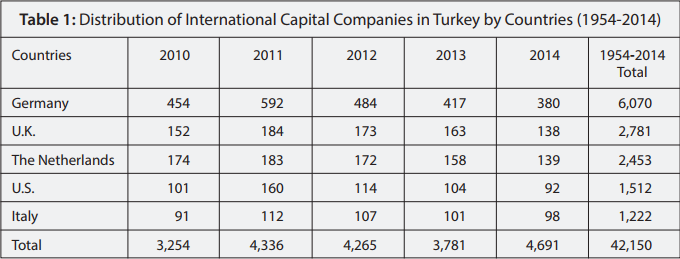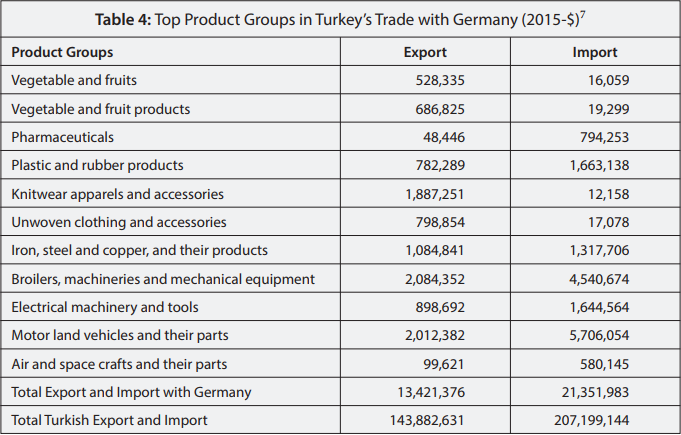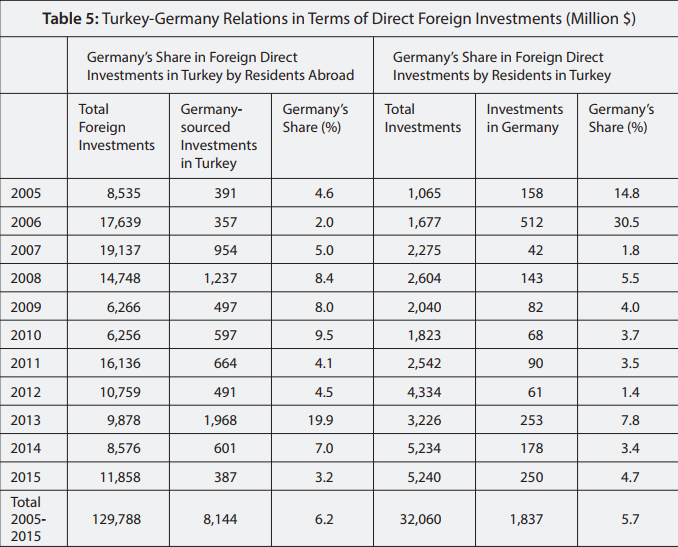“History unites or separates people and peoples. But I am certain that the German and Turkish peoples will stand not against each other but side by side in future centuries.”1
"Ogier Ghislain de Busbecq"
As an ambassador to the Ottoman Empire from the Holy Roman Empire and the King of Germany Charles V, Ogier Ghislain de Busbecq officiated in İstanbul between 1554 and 1592. Do the above remarks by Busbecq on the future of Turkish-German relations reflect the truth or do they simply remain a wish? Close cooperation between the two peoples in the late 19th century and their alliance in World War I helped the formation of long years of a brotherhood in arms (Waffenbrüderschaft), and the two states established by these peoples “stood together” as Busbeck had wished. However, as a result of the negative approach adopted by Germany in the 1980s towards the full membership of Turkey in the European Union (EU); and later on, its support or tolerance of outlawed terrorist organizations posing a security threat to Turkey,2 ensuing skepticism has led to an opinion that the States of Turkey and Germany, though not the Turkish and German peoples, no longer stand together but have begun to stand against each other.
Political problems remain an obstacle impeding the further development of bilateral relations, in spite of the fact that both Turkey and Germany have adopted the perspective of a “foreign policy focused on economic development”
Although Turkey and Germany are both NATO allies, the recent wiretapping scandal, the NSU murders, and serious mutual accusations in the media of both countries have consolidated such skepticism and opened the alliance of Turkey and Germany to question. Thus, it has been shown once again that bilateral relations between the two capitals are mainly determined, not by “historic friendship” (historische Freundschaft), as has been expressed on many occasion, but by “interests.” A Germany’s efforts, since the second half of 2015, to seek rapprochement with Ankara in order to ease the pressure on Berlin due to the Syrian refugee crisis can be considered as a case in point.
From an economic perspective, the concept of self-interest, i.e. self-gain, is the primary determinant, and Germany, as an important “trade state,” adopts a policy that prioritizes its economic interests in its bilateral relations with Turkey. This policy originates from efforts to shape political affairs in accordance with economic interests. In this context, Germany, in general, tries to avoid behaviors that negatively affect trade with Turkey, and watches out for political problems between the two countries so as not to jeopardize the investments of German firms in Turkey.
From Turkey’s perspective, Germany has always been given importance as Turkey’s number one partner in trade, a country that has sent the highest number of tourists to Turkey for many years, and a host country to millions of Turkish immigrants. Turkey has placed a great emphasis on its economic partnership with Berlin. However, one should note that political problems, which have been difficult to manage at times, remain an obstacle impeding the further development of bilateral relations, in spite of the fact that both Turkey and Germany have adopted the perspective of a “foreign policy focused on economic development.”3
Key Determinants of Turkish-German Economic Relations
Political Problems
The increase in political problems involving Turkish-German relations as of the 1980s has become one of the factors that negatively affect bilateral economic relations. To understand how the “brotherhood of arms,” which was highly spoken of in the past and the “historic friendship” have transformed into a problematic and insecure atmosphere today in Ankara-Berlin relations, it is beneficial to examine the historic background of Turkey-Germany relations and the characteristics of the so-called “historic friendship” period in particular. While doing so, one should always remember that the relations of international actors are shaped through the concept of “self-interest” not “friendship,” and that friendship matters only to a certain extent in order to acquire the desired gains.
In this scope, it should be underlined that in the late 19th century, the period in which the concept of friendship in Turkish-German relations came into parlance, the Ottoman State and the German Empire were not equal partners; at that time, Berlin was interested in İstanbul not because of a quest for a “friend” but for territory to take under control. Similarly, İstanbul was not looking for a “friend” while being interested in Berlin.
The Ottoman Sultan Abdülhamit II, wrestling to prevent the disintegration of his empire, preferred to form an alliance with Germany rather than Austria, Russia, Great Britain or France. He viewed the former as the emerging power of Europe and the latter as the biggest threats in this regard. Sultan Abdülhamit knew that the price of this alliance would be Germany’s increasing influence over the Ottoman Empire. However, he considered such an alliance necessary to balance out the countries posing a threat to the empire.
This, then, was the kind of “historic friendship” established between the Turkish Empire and Germany. Its most important characteristic was that the relationship was based on “a partnership of self-interests between unequal partners.” Germany, as the dominant party in this partnership, intended to exploit the vast Ottoman territory and to have İstanbul on its side in its struggle with other European powers, rather than to form a balanced cooperation with the Ottoman State.
The Ottoman Sultan, on the other hand, regarded Germany as the emerging power of Europe and, as such, a key partner for his policy of modernizing the Ottoman state, its army in particular. Abdülhamit had determined that financial and economic support from Berlin was of vital importance for the Ottoman State, whose economy and financial means had waned, and that the Ottoman State could survive with the support of Germany against states such as Britain, France and Russia.
The unbalanced partnership between the two parties resulted in the disintegration of both empires after being defeated in World War I. Despite being defeated in both of the World wars, Germany managed to pull itself up and became one of the key actors of the global system. Turkey, however, failed to regain the effective power it had enjoyed in the Ottoman era.
Hence, with a few exceptions, the relation between Turkey and Germany has always been a lopsided affair between two states with different powers. Germany’s greater economic power, in particular, since the final period of the Ottoman Empire, has led Berlin to aspire to take the lead in its relations with Turkey, and Germany has not refrained from adopting policies to irritate Turkey when it failed to sway Ankara at will.
In the wake of tremendous economic growth in the 2000s, Turkey has emerged as a more effective actor; therefore, it has started to challenge the pressures and actions of its Western allies, and has recently experienced more problems in its bilateral relations with Germany. Germany, like other Western countries, is disturbed by Turkish policies in which the interests and wishes of the West are taken into account less than they have been in the past. As a result, problem areas between the two countries have expanded.
The attitude that Berlin adopted against Turkey’s membership in the EU, since the incumbent Chancellor Angela Merkel took office in 2005, takes the lead among the factors that have had the most negative impact on Ankara-Berlin relations. In the framework of the Ankara (Partnership) Agreement signed in 1963, Turkey established a relationship with the EU inclusive of progression toward full EU-membership. This being the case, Turkey has been very disturbed by the policies, adopted by countries such as Germany, to curb Turkey’s accession to the EU. This tendency has been particularly highlighted during the period of Germany’s Christian-Democrat governments.
In contrast, Turkish-German relations were quite good in 1998-2005, when Germany under the leadership of former Chancellor Social Democrat Gerhard Schröeder, exhibited an attitude in favor of Turkey’s EU bid. This indicates how effectively Berlin’s stance towards Turkey’s EU membership determines its relations with Ankara.
Economic and Foreign Policy Approaches of the Two Countries
Although economic circles in both countries seek to disregard political hurdles between Berlin and Ankara when it comes to their own economic planning, it is evident that a sound political atmosphere encourages investors as well as trading groups, and that these actors postpone potential initiatives and incline towards other countries for investment and trade when political problems loom too large.
The periods of political complications negatively impact Turkey-Germany economic relations; however, the economic and foreign policy approaches of the two countries are generally intended not to reveal this negativity. In this scope, Germany, as a country of trade, slants toward economic partnership in foreign policy in general, and follows a policy to increase its volume of trade with Turkey, and to increase the investments of German companies in Turkey.
Exceptions in Germany’s approach to have better economic relations with Turkey were experienced during World War I and II and in the post-war periods. During the wars, Berlin set its foreign and economic policies around power politics rather than economic cooperation; therefore, both World War I and II both badly affected Germany’s policy towards Turkey and its bilateral economic relations. Defeated in both wars, Germany failed to remain Turkey’s number one trade partner in the post-war periods. However, shortly after the wars, Germany managed to return to its foreign policy based on economic cooperation, a move which created positive reverberations in bilateral relations with Turkey, and the two countries rapidly developed economic ties.
From Turkey’s angle, it is inaccurate to assert that Ankara, in general, adopts an approach to “put its foreign policy into the service of economic development.” Seemingly, during the periods in which Turkey set a goal to become a country of trade like Germany, it has tried to follow a foreign policy accordingly and has designed its economic policy accordingly as well.
In these periods, Turkey has tried to prevent political problems with other countries so as not to cast a shadow over economic cooperation, and has introduced legal regulations to encourage trade, and to make foreign investments in Turkey easier. This policy has affected Turkish-German relations, and significant developments have been made in the countries’ economic bilateral relations during periods in which Turkey has adopted such foreign and economic policies.
The connection between the economic approaches taken by the Turkish governments, and their understanding of foreign policy in Turkey-Germany relations, is evident in the country’s increase in trade with Germany during the Turgut Özal period, as Turkey followed a policy of a more outward-oriented and liberal economy, and in the 2000s as Turkey opted to open up to the world.
Although Turkey benefits from investments from Germany and is in the category of emerging economies, Berlin favors other “emerging countries” over Turkey; therefore, the investments of German companies in Turkey have comparatively decreased
The total volume of trade with Germany was 1.7 billion U.S. dollars in 1983 when the Özal government took the helm. With the export promotion policy and a multi-dimensional foreign policy, Özal intended for Turkey to reach a level of economic power so strong as to compete with the world. When Özal died in 1993, Turkey had achieved a total trade volume of 8.1 billion U.S. dollars with Germany –an increase of about 4.7 times since 1983. In the 1990s, conversely, Turkey neglected economic development, instead favoring security policies both domestically and abroad, and weakened its economic relations with Germany, as it did with other countries.
Unstable coalitions, the 1997 post-
modern military coup d’état, and the 2001 economic crisis stigmatized this period of limited economic development. Considering that this period continued until the 2002 parliamentary elections, Turkey’s total trade volume with Germany increased only 1.6 times, attaining a level of 12.9 billion U.S. dollars during the period of security policies from 1993 to 2002. After winning the November 2002 general elections, the Justice and Development Party (AK Party) reverted to the development model of the Özal period, based on a multi-dimensional foreign policy and export, a move which positively affected Turkish-German economic relations. Within a span of six years, from 2002 to 2008, trade volume between the two countries reached a record-breaking level of 31.6 billion U.S. dollars, roughly a 2.4 percent increase.
A similar trend may be seen in the activities of German companies in Turkey. Between 2002 and 2008, the number of German firms jumped from 992 to 3,296, a 3.3 percent increase, as the AK Party’s economic policies in the 2000s facilitated foreign capital inflow. The figure kept rising even during crises years, reaching 4,7904 in 2011 and 6,070 in 2014. 5,079 of these firms started to function between 2003-2014, indicating that Turkey has become a center of attraction for German-capital companies. There were 6,070 companies from Germany5 (14.4 percent) in a total of 42,150 foreign capital companies in Turkey between 1954 and 2014, proving that Germany had a big lump share in foreign capital inflow to Turkey in the same period.
One can appreciate the impact of the economic politics adopted lately if one considers that the 8.4 billion U.S. dollar portion of a total of about 12.8 billion U.S. dollars capital inflow to Turkey from Germany between 1980 and 2015 was realized in 2005-2015. However, Germany dropped down to 6th place in the ranking of foreign direct capital inflow to Turkey in 2005-2015, despite the increase in German capital investments in Turkey. This is due to the fact that Germany has changed its economic policies and has prioritized investments in China, India and Brazil lately. Although Turkey benefits from investments from Germany and is in the category of emerging economies, Berlin favors other “emerging countries” over Turkey; therefore, the investments of German companies in Turkey have comparatively decreased.
Panorama of Turkey-Germany Economic Relations
By looking at the level of economic relations between Turkey and Germany, one should realize that each differently reads the intensity of these relations. For Turkey, Germany is a key trade partner, an important investor, and one of the largest sources of tourism income. For Germany, however, Turkey does not carry the same significance.
Trade with Turkey, investment made by Turkish companies in Germany and other forms of economic input from Turkey do not occupy top spots in the German economy. The two countries have very different economic capacities. Gross Domestic Product (GDP) in Germany is 3.9 trillion U.S. dollars as opposed to Turkey’s approximately 800 billion U.S. dollars. Therefore, no one should expect Germany and Turkey to be equally important for each other.
Germany’s Turkish labor force, some of whom have been granted German citizenship, plays a vital role in Turkish-German relations and in Germany’s economic life. It would not be a mistake to say that their role will significantly increase in the years to come
A glance at the history of bilateral economic relations reveals that the economic relations between Berlin and İstanbul were deepened as of the late 19th century, when Germany was regarded as an ally of the Ottoman Empire. Projects such as the Hijaz Railway (now in Saudi Arabia), constructed with German capital and engineering in 1900, and the Baghdad Railway project launched in 1903, prognosticated a promising future for both the economic and military aspects of Turkish-German relations.
During the reign of German Kaiser Wilhelm II, who was planning to wield more influence over the Ottoman State with the completion of these railway projects, initiatives for the armament and industrialization of the Ottoman State stood out in bilateral economic relations. The agreement signed in 1961 for the recruitment of Turkish workers by Germany was one of the critical turning points in economic relations between the two countries.
On account of this agreement, the number of Turkish workers in Germany continued to increase, even during periods in which Germany no longer needed labor migration; today, the Turkish population in Germany has exceeded three million, bolstered by the migration of the families of these workers. As a result, Germany’s Turkish labor force, some of whom have been granted German citizenship, plays a vital role in Turkish-German relations and in Germany’s economic life. It would not be a mistake to say that their role will significantly increase in the years to come.
The establishment of the Turkish-German Chamber of Industry and Commerce in the German city of Cologne in 2004 should be considered a belated step, considering the level of economic ties between the two countries. The Chamber’s relocation of its headquarters to Berlin in 2012 has augmented its vital role in the development of economic ties between Turkey and Germany.
Trade Relations
Germany has occupied a very important place in Turkish foreign trade for over a century. Right after the World Wars I and II, trade between Germany and Turkey temporarily faltered due to the circumstances of the period, but promptly recovered, and Germany expeditiously became Turkey’s number one trade partner. From Germany’s point of view, however, it is impossible to say the same with regard to Turkey.
In the rankings of Germany’s trade partners, Turkey slips to between the 15th and the 20th place in general, although this changes periodically. The total number of imports from Germany valued 21.3 billion U.S. dollars in 2015, and Turkey was ranked the 17th in Germany’s exports. On the other end, in 2015, Turkey’s exports to Germany were valued at 13.4 billion U.S. dollars ranking the 19th in Germany’s imports.
As seen in Table 3, which depicts the trade volume between Turkey and Germany after 1980, Germany had quite a high share in Turkey’s export figures (around 20 percent), but Turkey’s imports from this country remained around 15 percent. Germany’s exports and imports from Turkey fell to around 8-10 percent in the 2010s.
Graph 1: Turkey’s Trade with Germany 2000-2015 (Million $)
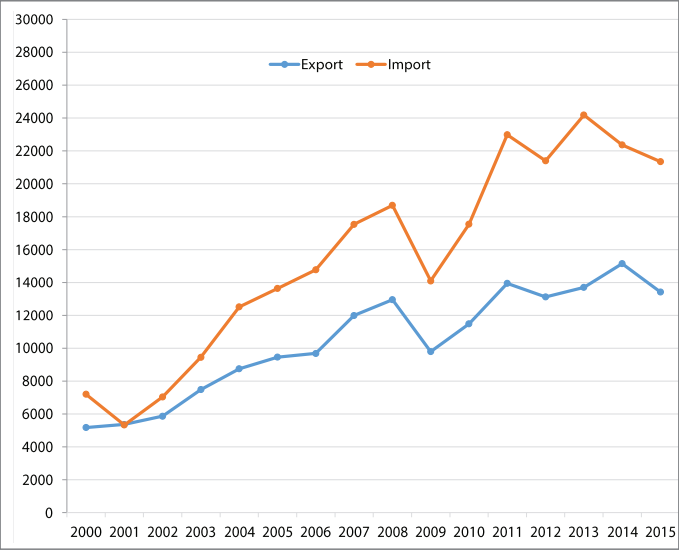

The reason for such a decrease is that Turkey has explored new markets and predominantly imported goods from Russia and China, countries which have both rapidly increased their imports from Turkey. Still, Germany maintained the first place on Turkey’s export list. Although Germany clearly dropped down to 3rd in the ranking of Turkey’s imports, as Russia and China topped the list according to the 2014 figures, Germany, once again, outpaced Russia in exports to Turkey in 2015.
In 2015, Germany, with 34.7 billion U.S. dollars, became Turkey’s largest trade partner in foreign trade volume.6 As seen in Graph 1, Turkey’s imports from Germany decreased in 2014 and 2015, and exports to Germany dropped in 2015 due to a general decrease in Turkish foreign trade that year. In Table 3, the data on Germany’s share in Turkish foreign trade indicates that the share of Turkey’s import from Germany in total import figures did not decrease but rather increased.
In Germany’s exports to Turkey, industrial products (including motor land vehicles, machinery and mechanical equipment) stand out among the top export products. Although Turkey has predominantly exported similar industrial goods to Germany in recent years, textile and agricultural products still top the list. However, about 70 percent of Turkey’s exports to Germany in 2015 consisted of industrial products, signaling noticeable changes in this area. Compared to the 1980s and the 1990s, the share of agricultural and textile goods decreased in Turkey’s exports to Germany.
Mutual Investments
As far as trade figures are concerned, Germany continues to be Turkey’s most important partner, but cannot maintain the same position in terms of investments. Table 1 and Table 2 depict a huge jump in foreign capital investments made by German firms in Turkey between 2002 and 2015, compared to previous years. However, Germany is ranked 6th (with 8.4 billion U.S. dollars) in the total number of foreign capital investments in Turkey following the Netherlands, the United States, and Austria.
Germany continues to be Turkey’s most important partner, but cannot maintain the same position in terms of investments
On the other hand, Germany is far ahead of other countries in the number of foreign companies investing in Turkey. The number of such German firms in Turkey sat at 5,079 in 2003-2014, leaving British, Dutch and American companies far behind. Considering the total amount of foreign investment in Turkey, the investments of German companies in Turkey are on a smaller scale compared to others, and their area of concentration seems to be in manufacturing and services sectors.
In the period of 2005-2015, German companies constituted 6.2 percent of total foreign direct investments in Turkey, equal to 8.1 billion U.S. dollars. On the other hand, the scarcity of investments made by residents of Turkey in Germany should be noticed. Companies in Turkey invested 1.8 billion U.S. dollars in Germany, which is 5.7 percent of Turkey’s total foreign investments.
Table 5 indicates that the mutual investments of Turkish and German companies dramatically change by years. Capital flow from Germany to Turkey was significant in 2008-2014 in particular, and capital mobility from Turkey to Germany rallied in 2005 and 2006. As Germany’s share in total foreign capital investments in Turkey stands quite high in general, Turkey’s share in foreign capital investments from Germany remains around 0.5-0.8 percent.8 The huge difference stems from the fact that both countries have different economic capacities and that Germany has a remarkably outward-oriented economy.
Graph 2: Mutual Direct Foreign Capital Investments in Turkey and Germany 2005-2015 (Million $)
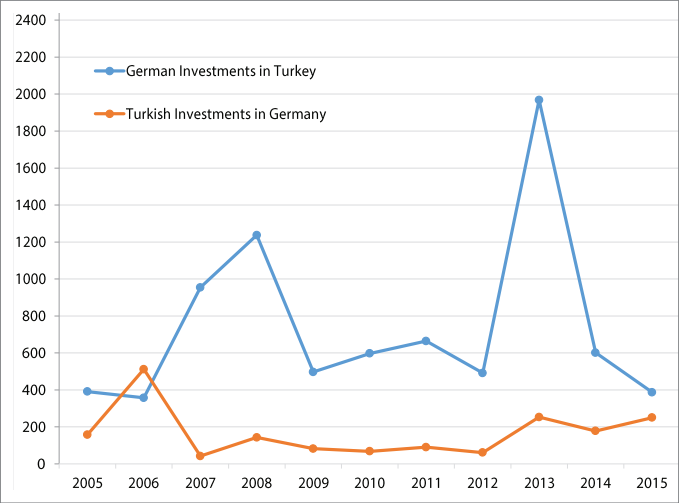
Investments made by Turkish-origin residents of Germany outperform the investments made by residents of Turkey in Germany. The total number of workplaces owned by Turkish citizens in Germany was 82,400 in 2015 and their total revenue amounted to 46.1 billion Euros in the same year, which generates a value equal to 5.7 percent of Turkey’s GDP. In the same workplaces, 41,254 of a total of 436,774 workers are of German and non-Turkish origins.9
Turkish people who emigrated to Germany as of the 1960s made most of their early investments in Turkey with the hope that they would return someday. As they decided to settle in Germany for good, however, a significant portion of their investments remained in Germany. Considering that almost half of Turkish immigrants in Germany still have ties in Turkey, it may be predicted that their properties and economic activities in Germany will still be essential in the development of economic relations between the two countries.
Conclusion
In terms of sizes and goals of their economies, the level of economic relations between Turkey and Germany seems lower than what it should be. For Germany, it is crystal-clear that the 34.7 billion U.S. dollars trade volume between Germany and Turkey in 2015 needs to be increased, considering that Germany’s annual trade volume with the Netherlands, the GDP of which is almost equal to that of Turkey’s, amounts to about 190 billion U.S. dollars.
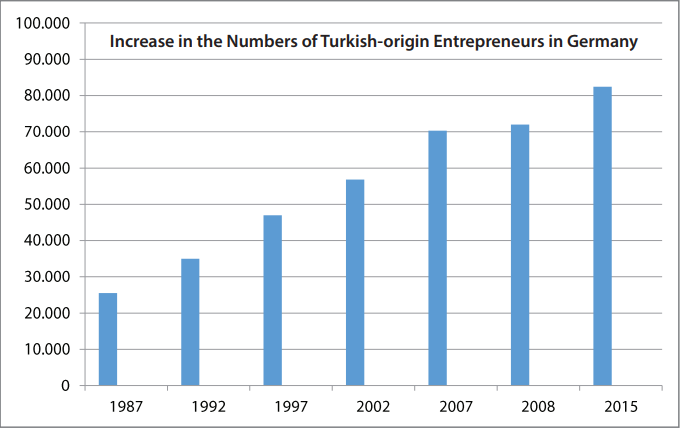
For Turkey, given its current trade volume with Germany, it seems impossible for the Ankara government to meet its goal of being among the top ten economies of the world as per the 2023 vision. In order to achieve this objective, Turkey should have a total trade volume of at least 1 trillion U.S. dollars, and that would require a 100 billion U.S. dollars trade volume with its number one trade partner. In light of these calculations, the trade volume with Germany in 2015 is very low for Turkey, as well, although Germany remains Turkey’s largest trade partner.
Figures of mutual foreign investments between Turkey and Germany are also far lower than they should be. Ankara and Berlin have many productive areas of cooperation that could be expanded upon. For instance, if Germany shares its experience in renewable energy sources with Turkey, which is foreign-dependent on energy, sizable investment opportunities in this field could arise between the two countries. Turkey has suitable conditions in terms of wind and solar energy that could provide incentive for the two countries to act together. In addition, cooperation against dependency on Russian natural gas should be regarded both as an opportunity and an imperative for Germany and Turkey.
With that said, Germany’s unwillingness in earlier projects to transfer energy sources from Iran, the Caspian Basin and the Gulf to Europe through pipelines via Turkey shows that the “trust” relationship, as a requirement of economic cooperation between Ankara and Berlin, has not yet fully been established. Because of this, both countries should do their best to eliminate any factors that preclude the trust relation, and should take steps to improve their economic cooperation. This cooperation is critical for the economic growth of both Turkey and Germany.
Endnotes
- An excerpt from the letter written by Ogier Ghislain de Busbecq, or Busbeck, the ambassador of the Holly Roman Emperor and King of Germany Charles V to the Ottoman Empire, in. Kutay, C.: Kader Bağı – Das gemeinsame Schicksal, 1988, p. 18.
- Such as the Kurdistan Workers’ Party (PKK) and the Revolutionary People’s Liberation Party-Front (DHKP-C).
- This is particularly true of Turkey during the late President Turgut Özal and the Justice and Development Party (AK Party) periods.
- Yeşim Kuştepeli, et.al, “Turkish-German Economic Relations via Foreign Direct Investments and Patents,” Entrepreneurship and Innovation Management Magazine, Vol. 1, No. 2, June 2013, p. 34.
- http://www.ekonomi.gov.tr/portal/content/conn/UCM/uuid/dDocName:EK-212362.
- http://www.tuik.gov.tr/PreTablo.do?alt_id=
1046. - In the trade between Germany and Turkey, the groups of products worth over 500 million U.S. dollars are depicted in the table.
- As of 2014, Germany’s foreign capital investments amount to 1.9 trillion U.S. dollars, ranking Germany the 3rd after the United States and Great Britain.
- Faruk Şen, “Avrupa Birliği ve Almanya´da Türk Girişimcilerinin Ekonomik Gücü ve Türkiye’nin Ticaret Hacmindeki Konumu,” TAVAK, December 2015, p. 8.


